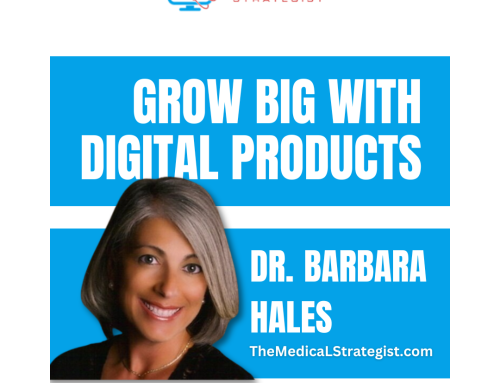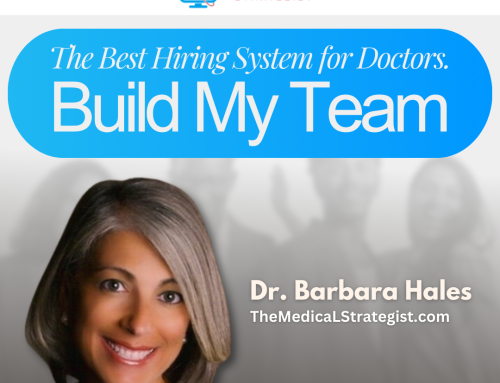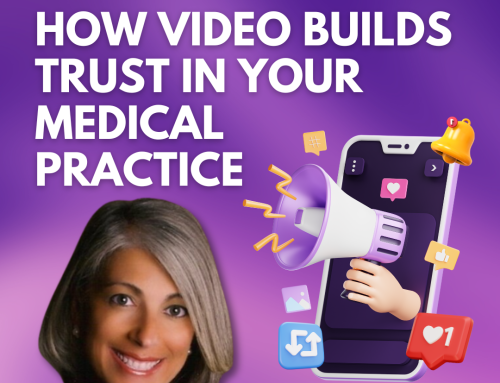Podcast: Play in new window | Download
Subscribe: RSS
In this episode, Barbara and Dick Grove discuss:
- How can you take your personal branding and visibility to the next level through PR
- What are the difference between advertising, marketing, and PR
- What should you look for and ask when considering hiring a PR team
Key Takeaways:
“No matter how great your story may be or how great the product you have, make sure you’re talking about it enthusiastically and with passion. The media and the audience responds to that.” – Dick Grove.
Connect with Dick Grove:
Website:https://inkincpr.com/
Twitter: https://x.com/inkincpr
Instagram: https://www.instagram.com/inkincpr/
YouTube: https://www.youtube.com/inkincpr
LinkedIn: https://www.linkedin.com/in/dickgrove/
Connect with Barbara Hales:
Twitter: @DrBarbaraHales
Facebook: facebook.com/theMedicalStrategist
Business website: www.TheMedicalStrategist.com
Show website: www.MarketingTipsForDoctors.com
Email: info@TheMedicalStrategist.com
YouTube: TheMedicalStrategist
LinkedIn: www.linkedin.com/in/barbarahales
Books:
Content Copy Made Easy
14 Tactics to Triple Sales
Power to the Patient: The Medical Strategist
TRANSCRIPTION: (183)
Dr. Barbara Hales: Welcome to another episode of Marketing Tips for Doctors. I’m your host, Dr Barbara Hales.
Today we have with us a very special person. He is Dick Grove. Dick is a public relations career professional with a history of practice over 50 years, including the C suite with major organizations and running his own firm. Dick Grove, the CEO and founder of the long-running INK Inc Public relations. It is a wealth of knowledge about the industry. From what reporters and producers want, it shows how to crack through into the mainstream media and what to look for and expect. If hiring a PR team, Dick has his finger on the pulse of an often misunderstood industry. Welcome to the show Dick.
Dick Grove: Thank you very much. I appreciate you having me.
Differences Between Advertising, Marketing, and PR
Dr. Barbara Hales: Is advertising, marketing or PR better to increase visibility, and what are the differences?
Dick Grove: Well, in one should have if one has a comprehensive program of communication, they’re going to be able to use all three. Each does a different thing, and each supports the other.
Advertising is paid media. Meaning you pay to have your message produced, broadcast, printed, etc. That’s a paid advertisement.
Own media means your podcast. I mean own meaning your podcast, your website, etc. You control that, and you control again, the content that you can put out there on it, and to a degree, the audiences that you’re going to aim it at.
Earn media public relations is just that. You have to, it’s not paid, and you don’t own the content. But what you do is you rely on third parties, ie the media editorial side of the media to write about you, to do stories, to review your product, to review your company, etcetera, and they determine the content, not yourself. The difference, and the reason that it’s in good is that it adds the credibility of having a third party saying nice things about you, as opposed to you saying nice things about yourself.
All three are very important, and all three can support the other. Another really advantage. Another really good point of earned media, or public relations is that it supplies the credible content that can be used in the other areas. You could use it in an ad, you could use it on your social media in particular, and that becomes, in other words, you can share the fact that someone on the editorial side of media that are reaching your audience are saying nice things about you, and you can share that and add to the impact of it through social media, and even to a degree, through paid media or advertising. So all three are important, and all three serve a slightly different but compatible purpose.
Dr. Barbara Hales: Unless you are the developer of new medical device or a new technique, even though you are a medical professional, there are other professionals in your business that are probably pretty comparable. How do you establish yourself as an expert to the media over your competition?
Establishing Expertise in the Media
Dick Grove: Well, you establish yourself, first of all, I believe one you should not rely on yourself in terms of when you’re trying to reach out through the media. But, I mean, I’m a PR and media earned media expert and professional, so my what I would say is the first thing you’ve gotta do is get the media to write about you, support you, publish what you’re doing, so that you become that kind of an expert within your category, within your industry.
In the case of like a medical device or something, the best thing you can do, and by the way, I do believe that it doesn’t have to be hiring a big PR firm or even a moderate PR firm like myself, but you can hire a good publicist, depending on but you’d still need a professional that knows how to write and put together what your message is, and then to present it to the right audiences through the media.
So how do you become an expert? You do it by first of all, having someone put together a various kind of plan that suggests how you can go about doing that through the media. It could be publishing articles. It could be getting reviews within the even the trade, medical trade media of your device and so forth. It could be producing some stories that would be in the general media so that the patients themselves can be asking about it when they are talking to their medical professional.
Dr. Barbara Hales: When you are looking to get a potential PR team, what do you look for? And what do you ask when meeting them?
Selecting the Right PR Team
Dick Grove: Well, what I would suggest you look for is one, experience with the media, almost as much as experience within your particular function or profession. It’s always good to have someone that understands the Medical Media and so forth. But in reality, what we found over the years, and we’ve worked for a lot of different kinds of things, technology, medical devices, even a pharmaceutical companies and so forth, what we have learned is the media are pretty much the same in any kind of industry or profession, meaning they’re looking for news that will be valuable to their particular audience. So that most important thing is to look for a professional that understands the media, that understands how to craft and develop a pitch to the media that will resonate with them, that doesn’t mean that one can’t do it on their own, but usually it’s when, when you’re doing it on your own, you’re a little bit too close to the trees, as they say. You need a professional that can be able to stand back and say, Okay, here’s what it really does. Here’s why it will be interesting to the media. Here’s the kind of stories that they’ve been doing.
This is all work that, frankly, a person that’s running either a medical device company or has a practice as a practitioner themselves in the medical profession, they should be concentrating on what they do best and allow a media professional to do what they do best.
But but how you do it? You look for experience. You look for someone that where you feel there’s a sabbatical with them, where there is a sense of when you’re talking and interviewing people to that will help you that you feel there’s a chemistry between and a lot of people don’t realize, but that’s terribly important, because in effect, that professional, that publicist is going to be working with you very closely and in fact, emulating your quote unquote voice with the media. So you have to know them pretty well, and you have to feel comfortable that they’re going to understand what you’re trying to say, even though they may want to say it a little differently than you do, but they understand the point you’re trying to get across.
Dr. Barbara Hales: When you figure out what a reporter needs when they’re looking for information to publish?
Understanding Reporter Needs
Dick Grove: Well, you examine the medium itself. I mean, a reporter works for somebody, okay, or they freelance for somebody, but you look at the medium itself, you look at the publication or the broadcast or the show, or whatever it is, and you understand the kind of audience that they reach with them, and does it fit your needs in terms of the kind of audience you want to have your story presented to so that it gets the maximum impact and value back to you. \
So the first thing you do is you, you pretty much look at the media, see what’s being written, what’s being done and so forth. And again, that’s another where a publicist can help you because that’s what they do all day long is talk to the media and understand what the media is looking for. The other thing is look at what else has been written or broadcast in that medium, so you get a sense of how they present a story, and if you’re comfortable with that, you get a good feel for that.
So that’s the two most important thing is make sure you’re talking to somebody that the audience reaches is, the audience of that publication or broadcast reaches the audience you want to reach, and secondly, that they understand and have experience on how to that medium understands how to tell a story and whether it’s done in the context you feel comfortable with you.
Dr. Barbara Hales: How do you build a PR presence?
Building a PR Presence
Dick Grove: How do I build a PR presence?
Dr. Barbara Hales: How does anyone build a PR presence?
Dick Grove: Well, I would say you, first of all, you’ve got to have a little patience. That’s the first thing, because it you don’t suddenly gain a different if, whatever it is that you’re trying to build in the way of a PR presence, which basically means your brand, whether it’s be an individual, whether it be a doctor, whether it be a clinic, whatever it is, you’re building a quote unquote brand by doing that. To do that, you have to often start small. You have to be able to reach again through the kind of audience with the kind of stories and the kind of things that you think will resonate with them. But you build small, slowly and up.
I’ve had clients that come to me and say, Boy, I’ve got this great new dental device, or I’ve got this new thing that’s going to revolutionize the world. I want you to get me in the Wall Street Journal. I want you to get me in the New England Journal of Medicine. I want you to give me all these different places. And I say, well, let’s slow down. Okay, let’s see what kind of where you are on some of this and understand it’s going to take it’s in many ways and I hate to use a word, but it’s a slog. You build a foundation first, you often have to go to the smaller medium to get stories, and then use those stories to build to a bigger mediums and bigger publications and so forth. That’s usually the best way to do it.
Now that doesn’t say that you might have something that’s so revolutionary that will have instant impact, but we found over the years that I’d probably say 99.9% of people that they think have the greatest story that’s never been told. It’s a story that has to be told slowly and carefully and so patience is the first thing and then the ability to supply the material and the information that your publicist or the media through your publishers is looking to help you with that you cooperate, you collaborate, you communicate, and you make sure that you’re getting the questions answered that the media is asking you before they do a story or whatever. It’s a slow but surely over a period of hopefully not a lot of time. It may take a month, it may take a year, but slowly but surely, you’re building that kind of foundation that will give you a a presence in the long term.
Dr. Barbara Hales: Once you’re lucky enough to have tap to your press, how do you leverage it? Or how should one leverage it?
Dick Grove: Well, first of all, I make an assumption, but it’s a nevertheless, we ask a lot of questions that the client has a social media program in place, or they should have some social media program in place. In today’s world, it’s not enough to have the USA Today do a story on you, or that have even a top medical journal during a story on you. You’ve got to be able to leverage that through other means. And as I mentioned in the very first question, one of the things you do is you leverage those kind of things through social media. And we advise our clients on that. We can help them with it, but basically we help them to say, look, this is only the first step. It’s very nice to have a story, and you can have it reprinted and put it on your wall, but what you really need to do is have that redone. And what we call it, what you a lot of people call the long tail. Make sure that that has a long tail to it that original story. So my advice is, I you really have to leverage it through social media and even own media, like your website and so forth.
Get the maximum value out of any kind of story that’s done on you because they’re rare and they’re valuable and they’re credible. And maximize that credibility and that value in all of your different communications, even internal. If you have an internal newsletter, make sure people know that you’re out there and retelling your story and retelling it, and ultimately, you get the value. Because, you know, in the old days, it was called walking, being around the water cooler, where people are sharing stories. But all of my leaving comes down to that where you got to the point where people have seen it, heard it, know about it enough that they’re sharing it even in person through word of mouth.
Dr. Barbara Hales: At this point, can you give some interview tips to our listeners who want to take their branding to the next level.
Take Your Branding to the Next Level
Dick Grove: Well, interview tips, first of all, make sure you’ve had some practice and a little training, if possible. By that, I mean have somebody that could be somebody internally with you, but also that same publicist professional I’ve addressed, have them make sure they talk to you about some of the tips that are going to be necessary. Those could include anything is, first of all, just be calm. Make sure you’re presenting yourself visually okay. You don’t want to come across if you’re in a broadcast situation, whether it be a podcast or whether it be a broadcast piece that’s being done on you, and to a degree, even a print media that you’re being interviewed live or over zoom, etc. I mean, look professional. Okay, don’t, don’t look like you just came in from the hog farm. Look professional.
Secondly, sound assured. Sound assured as to what your product is and be succinct in your answers. Be succinct. Don’t feel like you have to over answer questions that are being done to you in an interview. Just answer the question succinctly, honestly, presented wise. Also, show enthusiasm and passion, if it’s at all possible. There’s nothing worse than a dull interview. No matter how great your story may be or how great the product you have, make sure you’re talking about it enthusiastically and with passion. The media and the audience responds to that. So those are the basic tips that we always give our clients. And like I said, appearance, confidence and passion and a sense of confidence of what you’re saying.
Dr. Barbara Hales: I think that’s all great advice, and I’m sure our listeners will take it to heart. This has been another episode of Marketing Tips for Doctors, speaking with Dick Grove. Till next time.
Dick Grove: Thank you very much. I appreciate it. Thank you.



